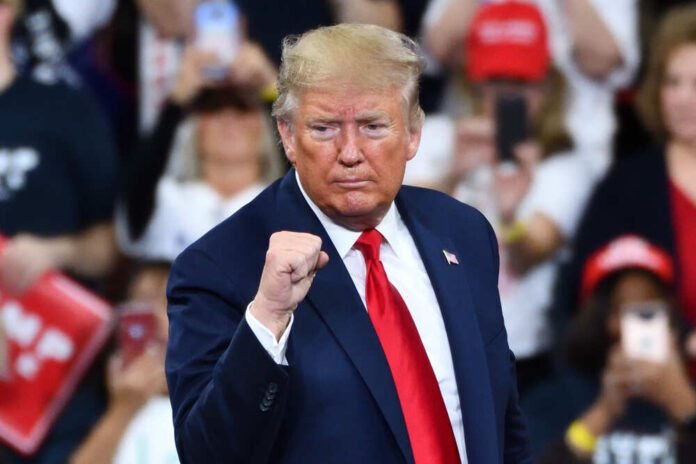
(TheLastPatriotNews.com) – Even when undeterred by legal challenges, and according to a senior campaign official, former President Donald Trump is setting his sights on securing the Republican nomination swiftly, with plans to clinch it sooner than expected.
This ambitious timeline is set around two weeks after Trump’s federal trial in March 19 next year, where he faces charges over his alleged efforts to overturn the 2020 election, begins.
This official, speaking anonymously to discuss strategy freely, indicates Trump’s team is confident of gaining the majority of delegates by Super Tuesday II, when several states hold primaries simultaneously. This strategy aims to solidify Trump’s lead well before this date, possibly as early as Super Tuesday on March 5 or following the initial caucus and primary contests in key states.
Trump’s campaign faces the challenge of juggling his trial, set to start on March 4, with ongoing campaign efforts. Senior adviser Susie Wiles expressed concerns that the trial might pull Trump off the campaign trail at a critical juncture, but remained optimistic about their preparedness.
While Trump leads in national polls and early states, he faces competition from figures like Florida Governor Ron DeSantis and former U.N. Ambassador Nikki Haley. Despite trailing in polls, these candidates are attracting significant support and funding, particularly in Iowa and New Hampshire. The Trump-aligned super PAC, MAGA Inc., has already launched a major advertising campaign against Haley in New Hampshire, suggesting Trump isn’t taking his rivals lightly.
Haley’s team questions Trump’s confidence in securing the nomination given his focus on opposing her in New Hampshire. Vivek Ramaswamy’s spokesperson, Tricia McLaughlin, asserts that their candidate is also committed for the long term. DeSantis, too, remains a formidable contender, promising a victory in Iowa.
Trump’s Iowa strategy aims for a significant win, with his campaign setting up an extensive network of precinct captains to mobilize new voters. This effort reflects a broader strategy to engage voters who have previously been inactive, a tactic that could prove pivotal in swing states during the general election.
This focus on expanding the Republican base acknowledges the challenge of persuading established voters to change their views on Trump, a divisive figure who has led the party in the last two presidential elections. Despite these challenges, Trump’s team is buoyed by favorable polls, including an NBC News national poll indicating a drop in President Joe Biden’s approval rating and a competitive stance with younger voters and Hispanic demographics, essential for the general election.
As Trump navigates his primary campaign and upcoming court dates, which Wiles describes as a “scheduling nightmare,” his team remains focused on a strategy that could potentially reshape the Republican electorate and pave the way for his return to the White House.














